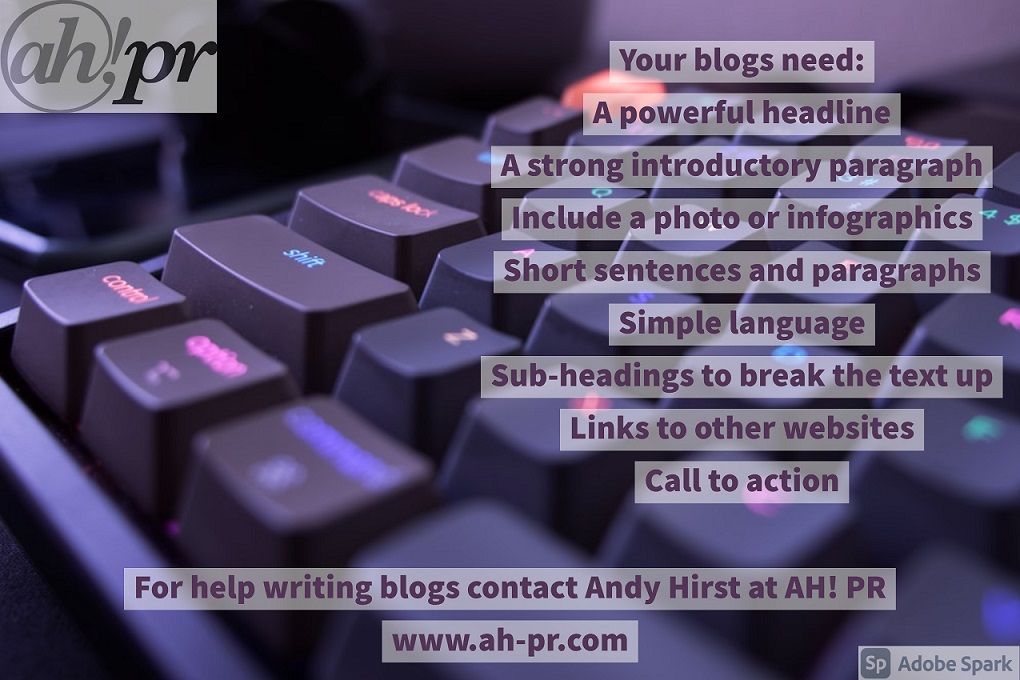All you need to know to start writing your own blogs to boost your business up the Google rankings
By Yorkshire blogger Andy Hirst from Huddersfield PR company AH! PR
A well-written blog can power you high up the Google rankings, saving you a fortune on Google adverts.
There is a skill to it, sure, but anyone can have a go.
So here goes, a step-by-step guide to writing a great blog and this is a blog I wrote which is sending hundreds of visitors to a client’s website every week http://ah-pr.com/work/how-a-blog-reached-number-one-on-google-and-brought-thousands-of-visitors-to-a-yorkshire-companys-website/
When you’ve decided what you’re writing about research the first page of Google under that topic’s keywords to see what’s already been written about it as you need to make sure you can write something better. This is absolutely crucial when writing blogs for businesses. If you can’t beat what’s already out there then don’t bother.
First of all think headlines. The title is all-important as research suggests only 2 out of 10 people go on to read a blog after reading the headline. Typical eye-catching headlines start with How To or 10 Tips For.
Give your blog a strong introduction with a bold statement to hook people in and make them want to read more. Also give them a glimpse about what you’ll be covering in the blog. One way is to ask a question and then tell your viewers how reading your blog will solve it for them.
No-one wants to read a mass of text so break it up with sub-headings in bold text to make it easier to read so the blog comes across in easily digestible bite-sized chunks.
Include a photo – I tend to pop it between the headline and the introduction – and if you have any infographics then Google loves them so include them too perhaps halfway down. You can download photos for free from websites such as Unsplash, Pexels and Pixabay and I put my infographic (see below) together for free on Adobe Spark (https://spark.adobe.com/sp/).
Make the paragraphs short and punchy. No-one will plough through long, rambling sentences. The art of writing is to be concise and to-the-point, bearing in mind that most people will scan read blogs rather than reading every word. I tend to use only 2 or 3 sentences in each paragraph.
Use bullet points where possible as it makes the information far easier to read and quick to understand.
Write simply and usually in a conversational style as though you’re having a chat with a reader. It gives the sense that you’re talking to them one-to-one. If a reader has to re-read a sentence to make sense of it, you’ll lose them.
Put links out to other websites which are relevant and will add to what you’re saying. You may also get links back from these websites which will be very helpful to power your blog up Google.
Always end with a conclusion that succinctly summarises what you’ve said and finish with what’s known as a call to action – that’s asking them to share on social media, leave a comment, answer a question you may have asked or click a link to buy a product or to get more information.
Make sure you have the right keywords in to maximize the blog’s search engine optimisation. More on that here http://ah-pr.com/blog/learn-the-vital-basics-of-keywords-and-seo-in-under-5-minutes
Some people reckon you need to write 1,000 words for a blog. Write what it’s worth otherwise it’ll get rambling and meandering but always make sure it’s more than 350 words. Mine tend to be between 500 to 700 words and have achieved the top spot on Google at that length.
Just a word of warning. If you publish anything at all – and I mean anything – it must not be defamatory or you could face legal action. Make sure everything you write can be backed up by evidence. It’s amazing how many people think they can say anything online and it’s only the media that can face action for libel. It’s not. Anyone can and I know of one person who was successfully sued for tens of thousands of pounds for defamation on social media.
That’s why it may well be worth using a professional to write your blogs and as a former news editor I’m up to speed on the laws of defamation. I’m easily contactable on 07985 654822 or email andy@ah-pr.com. (This is my call to action, by the way).
So, finally, to summarise, here is the basic blog template as, yes, you’ve guessed it, an infographic.

Follow this infographic for the basic template to writing your own blogs